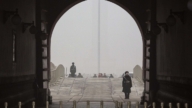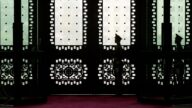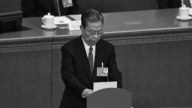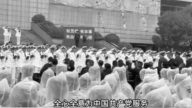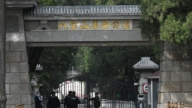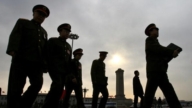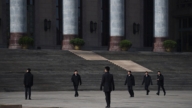【新唐人2013年11月14日訊】據大陸官媒日前透露的消息說,中共信訪制度將進行重大變革——取消信訪排名制度。也就是說,國家對各省市不再搞全國範圍的信訪排名、通報。有專家認為,中共這次舉動的影響不亞於廢除勞教制度。但訪民和維權律師認為,當局不從根本上解決行政不公、官方權利不受制約等制度性問題,信訪制度如何花樣翻新,也無濟於事。
據《新京報》11月11號報導,中共國家信訪部門對各省份取消排名通報制度,不再搞全國範圍的信訪排名、通報,各級信訪部門的信訪工作將不再以信訪數量多少為通報標準。
中共信訪排名制度始於99年7.20以後,中共當局為了杜絕法輪功學員進京上訪,令各地官員的升降賞罰與上訪人數掛鉤。
2005年,中共當局修訂《信訪條例》,將信訪人數排名作為中共幹部政績考核指標之一,規定「各級黨政領導成為信訪責任人,管轄的區域內訪民進京上訪次數與黨政領導的陞遷直接掛鉤」,將矛頭從法輪功擴大到所有訪民,導致各地政府不惜採取各種手段「截訪」、「抓訪」,甚至採用僱傭「黑保安」,私設「黑監獄」等違法行為,造成極大民怨。
大陸維權律師唐吉田:「我覺得,一定程度上,它是為了緩解社會壓力,比較信訪的這種弊端,可能是色彩上稍微有點淡化。實際上也是拉攏民眾吧,或者是拉攏這些受害者。」
有媒體指出,當局改革信訪制度,取消信訪排名,目地在於抑制攔訪、截訪等問題,減少民眾進京上訪。而據記者了解,實際上從今年3月起,很多省份就已經開始執行這一政策,沒有再收到國家信訪局關於各省市「非正常上訪」人次數的排名表。
不過,實際情況據訪民反映,各地方政府截訪、抓訪現象依然不見減少。
上海訪民俞忠歡:「據說大概今年上半年就開始執行了,但是還是有截訪的。他也要想把你這個案子,把它瞞起來嘛!總歸是,你不扣分,他也要攔截。官方攔訪現象沒有減少,越來越多。暴力攔訪,也是一樣的,而且現在手段越來越惡劣了,有的人已經被監控起來,有的可能還要拘留。」
大陸維權者人士認為,如果各地政府不在解決信訪問題本身上下功夫,再大的政策調整也是無濟於事。
俞忠歡:「這個政策也沒甚麼用處,你問題不解決有甚麼用呢?你問題不解決的話,我想他還是要到北京去的。關鍵是解決問題。而且最主要是,解決問題的話,你關鍵是不能蓋住,又要透明。」
據了解,目前取代以往信訪排名通報制度的是「點對點」通報制度。就是對於各省份的信訪工作,國家信訪局直接根據了解到的情況與各個省份單獨對接,進行一對一通報。對於信訪問題較多的省份,國家信訪局將對這些省份進行約談。
唐吉田:「我覺得問題不在於信訪制度上簡單的這種調整,最根本上是信訪制度設計有先天性問題。它是在行政違法和其他的官方權力不受制約、不受監督的情況下,很多人救濟無門才會想到更高級別的官方機構,甚至是到北京去告御狀,所以這是一個制度層面的問題,僅僅靠信訪本身這種簡單變化,它也解決不了根本問題。」
大陸維權律師唐吉田認為,這種由中央對地方,上級對下級的所謂「點對點」的垂直管理,很可能助長地方政府在信訪統計等方面,更多的弄虛作假和水分,也會使官官相護之風越發嚴重。
採訪編輯/張天宇 後製/鍾元
Interception of Petitioners Continues to Increases with the New Petition System
The Chinese state media reported that the petition system
will change, i.e., separating local officials’ performance
assessments from the number of complaints against them.
Also,the state will no longer issue a nation wide ranking report
of criticism.
While some people praised this move as significant as the
abolition of reeducation through labor, our investigation shows
that people have very little confidence.
They indicate that fundamentally not rooting out systemic
administrative injustices, as well as refusing to constraining the
authorities, will not reduce grievances.
The Beijing News reported on November 11 that the ranking
of officials’ performance will no longer be judged by the
number of petitions.
Quantity of petition will no longer serve as the
standard for reports of criticism.
This “petition vs. ranking" system began after July 20 of 1999.
The Chinese Communist regime initiated this system of
officials’ promotion & demotion based on the number of
petitioners for the purpose of blocking Falun Gong
practitioners from petitioning to Beijing.
A 2005 amendment of the Petition Ordinance entails that party
and governmental officials are assessed according to the
number of petitions in the jurisdiction area.
This amendment has led to interception and detaining of
petitioners including Falun Gong practitioners and people
addressing all sorts of grievances.
Illegal set-ups such as the so-called black security (hired agency)
and black jail (usually hotel) are also created and have caused
great resentment.
Tang Jitian, human rights lawyer: “I believe, to a certain extent,
it is meant to relieve the social pressures brought about by people
trying to address their grievances.
It is in no way to comfort the general public or the victims."
There are media reports that canceling the system of
“ranking vs petition" is meant to prevent interception of
petitioners visiting Beijing.
Our reporter found that since March this year,
this policy has been enacted in many provinces,
and the ranking report of “abnormal rate of petitioning" is
no longer issued by the state petition office.
However, a petitioner reflects that the actual interception and
detention of petitioners have not reduced.
Yu Zhonghuan, a Shanghai petitioner: “The policy was said to
have been enacted earlier this year, but the interception has
not stopped.
They don’t want you to reveal your case. No matter what,
even though they won’t get point deducted, they will continue
to intercept.
They intercept more and even more violently now.
It is getting more severe.
Many have been under tight surveillance
and even detention."
Rights defenders don’t believe that any more policies will solve
the problem if the fundamental issues of the complaints
are not solved.
Yu Zhonghuan: “This policy is useless.
When the problem is not resolved, people will visit Beijing.
The key is to solve the problem, but most importantly,
keep it open and transparent."
The new policy will conduct an individualized ranking report
instead of the nation-wide ranking and report of criticism.
That means the state petition department will issue the report
individually to each province.
The state will also conduct individual investigation of the
province receiving the higher volume of complaints.
Tang Jitian: “I don’t think a slight adjustment in the petition
system is the issue.
The fundamental problem of the petition system is that
it comes with an innate defect.
It is an organization people will go to when there is official
violations and people have unresolved grievances.
Therefore, the problem is about the governmental system.
A change in the petition system won’t help to
solve the fundamental issue. “
Attorney Tang Jitian indicates that such a vertical management
of central to local could result in fraud and fabricated data
in local governments and more cover ups.
Interview & Edit/ZhangTianyu Post-production/ZhongYuan


